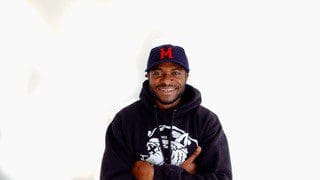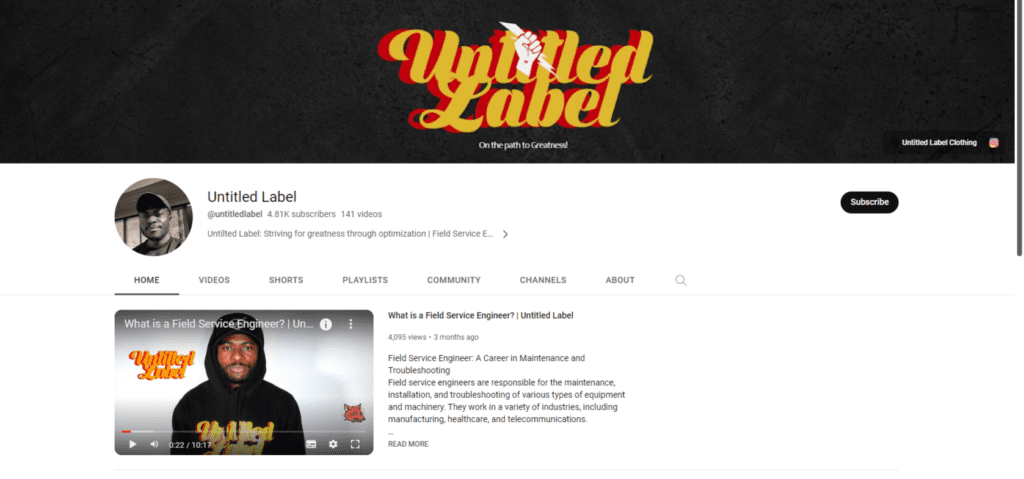John Missihoun Field Service Engineer and YouTuber
John Missihoun started his working life in the US Navy and is now a Field Service Engineer for Miltenyi Biotec. He is based in Texas in the USA.
John is also the Creative Director of Untitled Label and produces videos about working as a field service engineer.


Background and path to engineering
You have served in the US Navy. Was this an ambition from childhood? Did anyone recommend this?
No, it wasn’t. At that time of my life, it was the best course of action career wise. I was in college and wanted to change fields but did not want to incur more debt through loans. I reached out to a family friend who had previously served and retired and got some helpful information that led me to join the Navy.
What experience did you take from the Navy into civilian life?
My experience in the Navy has shaped my current life. There’s so much I’ve been able to take from my time there. In fact, the more accurate question would be – what experiences did I not take.
The most significant would be what I did career wise as a Fire Controlman as it shaped me into being a Field Service Engineer.
Life skills like time management, self-discipline, organisation, and accountability are in some way shape or form concepts I learned and/or improved by being in the Navy.
Have you always been interested in the way things work?
Yes, I have. I have always been a tinkerer. Even as a kid I loved to build things out of Lego and play sets. Growing up my curiosity continued to involve small motors and even motorized vehicles. As an adult I’m glad I get to do something that I find interesting.
Who has been an inspiration to you?
My parents and family the most at this stage of my life.
Move to the medical industry
You have moved from electronics to the medical industry? How difficult was the transition?
Surprisingly it was not hard for me. It was a lot to pick up and learn in a short amount of time, but my employer did a great job of easing me into this new career field following my military service. Learning the equipment itself was rather easy with my electronics background. Some of the other skills needed to be a Field Service Engineer, I learned on the go, but my military background aided me in managing those aspects and striving to be successful.
Which skills are interchangeable?
I’ve mentioned these before but interpersonal skills like time management, discipline, and accountability are crucial for being a good Field Service Engineer. Part of the job is being good at the administration tasks that come with the job. A lot of these tasks I did in my military career in some way shape or form. It serves as preparation for what I do now on the day to day.
We can also add skills like troubleshooting, attention to detail, organization, and determination.
Once an engineer is a good field service engineer, do you think it is possible to work in any industry and with any technology (with some training)?
YES!
I honestly believe once you can get the key principles down (see above), you can be successful within any industry. Having the electronic troubleshooting background and being a fast learner, the equipment and technology should fall into place with good training.


Typical week
Can you describe the type of equipment you support?
I support biomedical research equipment for cell and gene therapy. These pieces of equipment are used for cell isolation and analysis.
What’s your typical week like?
My week varies often but it always consists of maintenance, repairs, and possible installations. In a typical week I will have scheduled maintenance to complete already booked with customers. I go onsite to the customer location and complete the required maintenance and follow up with the customer. Throughout the week repairs will come in and I have to prioritize these assignments so there are a lot of moving pieces at play as an FSE. My goal in some way shape or form is to complete about four assignments.
How much of your time is spent ‘hands on’ with customers and how much on administration, training, and other aspects of your role?
I will say I have become proficient with my equipment rather quickly. So, taking that into account this is a rough break down of how I spend my time completing the job.
Travel- 30%
Hands on at customer site- 30%
Admin- 30%
Training / personal development- 10%
Support
Which other people in the workplace give you support?
With my current employer, I have a vast amount of support. I have an Admin department which helps with:
parts
receiving work tickets
general questions.
I also have fellow FSEs to reach out to when I have more job-related questions. Lastly, we have Service Support Engineers who are the subject matter experts when it comes to the equipment. They can also be reached when working on equipment or when I have more challenging questions. These are a few notable roles that I interact with as a Field Service Engineer.
Travel
How much travel do you do?
Now I will say I am doing about 30-40% travel. I think my current location helps with keeping travel down as there is a lot of equipment in my city of Houston in Texas. Often the workload here, keeps me from often traveling far.


Most challenging part of the job
What has been your most challenging job to date?
My most challenging job has been being a Fire Controlman in the Navy. That job taught me a lot, but for the amount of work required and the amount of time dedicated it was easily my most challenging job.
How do you explain technical issues to non-technical people?
I try to relate it to something that is easily understandable. I love to use simple examples to break down concepts. I also try to use visual cues as being a visual learner myself, it makes things easier to explain when possible.
What do you do when something is not working, and there is no obvious reason?
The first thing I try to do is carefully run through my process in case I may be missing a small detail. If nothing can be found, I do a little research on the equipment/issue in case it may have been observed before. Lastly, reaching out to a friend has proved useful as it introduces a new way of thinking and new possible solutions.
Making a future star
Apart from a strong technical background, what are the three most important skills for a field service engineer to have?
I can’t say this enough, but:
Discipline
Time management
Organization.
Having these three skills down will help guarantee success on the job.
What sort of personality traits are ideal for a field service engineer to be successful?
The three are: independence, professionalism, and good communication.
Social media and marketing
Can you explain how you had the idea for your YouTube channel and how you started?
I initially decided to create a YouTube channel to earn passive income by making videos. Originally my content focused on tech unboxings and reviews, but this required me to spend a lot of money on new equipment with little return as it was a new channel.
So, I decided to shift towards creating Field Service Engineer content as I wanted to integrate my passion for making content and video editing, with something I was already doing. Doing a little bit of research, I determined there was little video content on the matter and decided to fill the niche.


Where do your ideas come from?
My ideas mostly come from my experiences as a Field Service Engineer as well as from colleagues. Being new to this career path I want to provide a fresh set of eyes on this career to anyone that may be interested. Video ideas come from experiences that have taught me how to be better at the job. I’d like to share that with others.
How do you balance your two roles?
A LOT of discipline. It helps that the two roles sort of blend together but mustering the energy and determination to do both roles well can be hard. I usually focus on being a Field Service Engineer throughout the week and by the end of the week will have a video topic. I then use my weekend to create a video or my afternoons and evenings on weekdays if permitted.
Conclusion
Becoming a Field Service Engineer has been an interesting experience. I’m glad to have met more experienced individuals who have shared their experiences with me. Discovering this community has also been a blessing as there is a wealth of knowledge to tap into. No matter the industry, I think you can learn a few things from a solid Field Service Engineer.
Further reading
Field engineers in the medical field share their experience and advice.
Field engineers from different industries share their advice about the tools they carry with them.


Responses